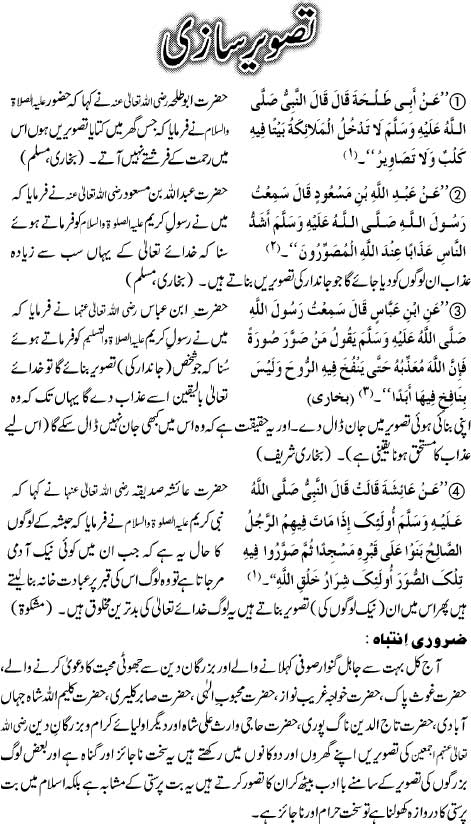
Rights Of Women
The pre-Islamic Arabs attached less importance to the person of a woman than that of a man. Thus, if the culprit was a man and the victim a woman, retaliation could not take place. The Qur’an abolished this inequality, and crimes against the woman were placed on the same level as those against the man, whether they concerned person or property or honor.
One may even say that in certain cases the rights of women are held to be more important. For instance, the Qur’an (24:4-5) decrees that if a man accuses a woman of immorality and does not produce proof, he is exposed not only to the penalty prescribed for a false accusation but to be declared for perpetuity as unworthy of giving an evidence before a tribunal (this in addition to the Divine punishment in the Hereafter, which however may be effaced in case of repentance). There is almost a consensus of opinion that repentance erases sin in the eschatological sense, yet the ineligibility to giving evidence remains constant in spite of the recognized repentance. The Qur’an seems to require the purging of society from the evil of inconsiderate talks, particularly in matters where injury is easy to inflict and difficult to remedy.
The perfect and complete individuality of the person of the woman is manifest in a most striking manner in the matter of property. According to Islamic law, the woman possesses the most absolute right over her property. If she has attained majority, she may dispose it of according to her will without reference to anybody else, whether it be her father, brother, husband or son, or any other person. There is no difference in this matter between a man and a woman. The property of a woman cannot be touched even if her husband or father or any other relative has liabilities exceeding his assets. Similarly, these relatives are not held responsible if she contracts debts. A woman has the same rights as a man for acquiring property. She may inherit it, receive it in gift or donation, earn it by her own work and toil; and all this remains hers and hers alone. She is the absolute mistress of her property to enjoy it or to give it to whomsoever she likes as a gift or to dispose it of, by sale or any other legal means, at her will. All these rights are inherent in a woman; there is no question of obtaining them through special contracts, with the husband for instance, or by an award depending on somebody else.
The right to inheritance requires some explanation. A pre-Islamic Arab woman had no right to inherit from anybody, either her father or even her husband. The Prophet (peace be upon him) did not pay attention to this question during the first 15 years of his mission.
The chroniclers mention that in the year 3 Hijra, a rich Ansarite, Aus Ibn Thabit died, leaving a widow and four daughters of tender age. According to the customs prevalent then, only male adults, capable of taking up arms in a war, had the right to inheritance; and even a minor son had no right to the property of his deceased father. So, the cousins of Aus took possession of all that he had left, and the family overnight became completely destitute and deprived of the means of livelihood. At that moment a passage of the Qur’an was revealed, promulgating the law of inheritance which is ever since practiced by Muslims, and even by some other communities, such as the Christians of the Levant. According to this law (4:7-12; 4:176), different female relatives have obtained the right to inheritance: wife, daughter, mother, and sister in particular.
With regard to inheritance, Islam makes no difference between movable and immovable property; everything must be divided among the rightful heirs. In order to avoid evil caprices, Islam has also prohibited the bequest of property by testament to strangers and the deprivation of near relatives. In fact the latter do not require to be mentioned in a will; they inherit automatically.
A will cannot even diminish or increase the rights of individual relatives to inheritance, the rights being fixed and determined by the law itself. The will is valid solely in favor of “strangers,” i.e. those who have no right to inherit directly the property of the deceased. Islam has fixed the maximum, which one can bequeath by will, and that is one-third of the whole property, the two-thirds going to near relatives. A will for more than one-third is valid only if the heirs unanimously accept it at the moment of the distribution of the heirloom.
The law of inheritance is complicated enough, for the shares of different heirs vary according to individual circumstances; the daughter alone or in the presence of a son, the mother alone or in the presence of the father, with children or without them, the sister alone or in the presence of the brother, father or children of the deceased, inherit in different proportions according to individual cases. It is not our intention to describe it here in all the details. The shares of female heirs may however be mentioned briefly.
The wife gets one-eighth if the deceased leaves also a child; otherwise she gets a fourth. The daughter when alone gets a half, several daughters get two-thirds which they divide among themselves in equal portions — all this when there is no son. in the presence of a son, the daughter gets half of her brother. The mother, when alone, gets a third, in the presence of the father, child, or brothers and sisters of the deceased she gets one-sixth. The sister does not inherit if the deceased leaves a son: but when alone, she gets a half; two or more sisters get two-thirds which they divide among themselves equally. In the presence of a daughter, the sister gets one-sixth; in the presence of a brother, she gets half of what he gets. There are also differences between the shares of full sisters, consanguine sisters, and uterine sisters.
- January, 6
- 2513
- Human Rights
- More
Tawheed Aur Wahdaniyat
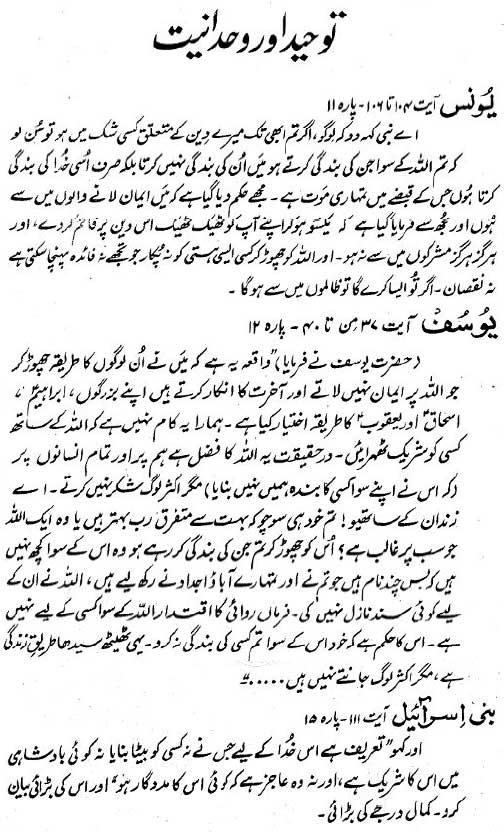
The Station Of al-Khawf
The Al-Khawf or fear station is one of the most splendid stations of the road and the most beneficial to the heart. It is also mandatory upon everyone. Allah said, “So fear them not, but fear Me if you are believers.” [3:175], “And fear none but Me.” [2:40], “So fear not men but fear Me.” [5:44]
Allah, subhanahu wa ta’ala, also praised His people in His book, saying, “Verily! Those who live in awe for fear of their Lord . . . It is these who race for the good deeds and they are foremost in them.” [23:57-61]
Aisha once asked the Prophet, sallallaahu alayhe wa sallam, “O Messenger of Allah, when Allah says And those who give that (their charity) which they give with their hearts full of fear . .” [23:60] is he the one who commits adultery, drinks alcohol, or steals?” He said, “No, daughter of As-Siddeeq. It is the man who fasts, prays, and pays sadaqah. But he fears that none will be accepted from him.” (Tirmithi and others)
Al-Hasan al-Basri said, “By Allah, they performed the acts of obedience and struggled in them and they were afraid that their deeds will be rejected.” The believer has combined good deeds and fear and the hypocrite has combined bad deeds and a sense of security.
Other terms have similar meanings to al-khawf but are not synonymous, such as wajal, khashyah and rahbah. Abu Al-Qasim Al-Junaid said, “Khawf is to expect punishment as long as you breathe.” It has been said that khawf is the restlessness of the heart because of the remembrance of the cause of fear. It has also been said that khawf is the strength in the knowledge of the rulings and decrees. This is the reason for khawf and not khawf itself. It was also said that khawf is the escape of the heart from the occurrence of adversity when the heart senses it.
Khashyah is more specific than khawf. Khashyah is a quality that is particular of the people knowledgeable of Allah. Allah, subhanahu wa ta’ala, says, “It is only those who have knowledge among His slaves that fear Allah.” [35:28]
As a result khashyah is associated with knowledge. The Prophet, sallallaahu alayhe wa sallam, is reported to have said, “Indeed I have the most piety for Allah and have the greatest khashyah for Him.” (Bukhari and Muslim) And he is the most knowledgeable of Allah.
Khawf can be likened to a movement or a reaction but khashyah is involvement, action, and tranquillity. A person who sees the enemy, floods, or similar causes of fear will have one of the following two reactions: movement; i.e., running away from the cause, which is the state of khawf; or staying calm and staying in a place where the cause cannot reach him, and this is khashyah. Rahbah is diligence in running away from adversity. The opposite of this is raghbah or longing which involves the travel of the heart toward its desires. There is symmetry between raghbah and rahbah both in their pronunciation and meanings.
Wajal is the shivering and breaking of the heart when remembering the One it fears, His authority, punishment, or seeing Him.
Haybah is khawf associated with glorification and reverence. Its peak is achieved when love and knowledge are strongly combined. Ijlaal is glorification associated with love.
Khawf is for the common believers, while khashyah is for the knowledgeable and the scholars. Haybah is for those who love and Ijlaal is for those who are close (to Allah). The presence of Khawf and khashyah is according to how much knowledge is there, as the Prophet, sallallaahu alayhe wa sallam, said, “Indeed I am the most knowledgeable of Allah amongst you and have the most khashyah for Him.” (Bukhari and Muslim) He also said, “If you would know what I know, you would laugh little and weep much. You would not have joy with your wives in bed and you would go out to high places and pray fervently to Allah, The Mighty.” (Ahmad, Tirmidhi, and others)
The person with khawf resorts to fleeing and holding. The person with khashyah resorts to holding to knowledge. Their similitude is like a person who has no knowledge of medicine and a skilled, highly trained, and educated physician. The former resorts to diet and escape for treatment of his ills while the doctor resorts to the knowledge of diseases and medicines.
Abu Hafs said, “Khawf is the whip of Allah. He corrects with it those straying from His door.” He also said, “Khawf is a light in the heart, with it one can see the good and evil. Everyone you fear you run away from except Allah. When you fear Him, you run away to Him.” The person with khawf is a person fleeing from His Lord to His Lord.
Abu Sulaiman said, “When khawf departs from any heart, it falls apart.” Ibrahim bin Sufyan said, “When khawf settles in the heart, it burns the places of vain desires within it and it kicks out the love for this world.” Thun-Nun said, “People are on the road (meaning the Straight Path) as long as they have khawf. When they lose it, they stray from the road.”
Khawf has not sought itself. It is simply a means sought to obtain something else. It disappears when the cause of khawf disappears. That is why the people of Paradise will have no khawf, nor will they grieve.
Khawf is related to deeds and actions, while love is related to Allah and His Attributes. The love of the believers to their Lord multiplies when they enter the House of Bliss and they will have no fear. For that, the station of love is greater and higher than the station of khawf.
The truthful khawf is what comes between the person and the prohibitions of Allah. If khawf exceeds that, then there may be a concern for getting into despair and hopelessness. Abu Uthman said, “The true khawf is being cautious of committing sins manifest or hidden.”
I heard Shaikhul-Islam Ibn Taymiyyah say, “The commendable khawf is what restrains you from the prohibitions of Allah.”
Al-Harawi said, “Khawf is to slip away from comfort and security by recognizing the warning of Allah.” The beginning of khawf is to fear the punishment. This is the kind of khawf that produces sound Imaan (faith). This can be attained by believing in the warnings of Allah and remembering the sin. Khawf is preceded by feeling and knowledge. It is impossible that a person may have khawf without having feelings of fear.
Khawf is associated with two things: first, the thing feared; and second, anything that may lead to it. Khawf can then be as great as the feeling of the person to the feared thing and what leads to it. When a person doesn’t think that something would lead to the object that should be feared, they would not fear that thing. The same is true if he does not know the measure of the fearful thing then, he would not have the correct fear.
Khawf (fear) and rajaa’ (hope) complement one another. The similitude of the heart in its travel to Allah is like a bird. Love is its head, and khawf and rajaa’ are the wings. When the head and both wings are sound, the bird is capable and skilled in flying. However, when the head is cut off, the bird will die. When the bird loses a wing, it then becomes a target for every hunter and predator. The scholars favored, however, the wing of khawf over the wing of rajaa’, especially when the person is young and healthy. They favored the wing of rajaa’ over the wing of khawf when the person is about to leave this world.
Abu Sulaiman said, “The heart ought to have more khawf. When rajaa’ dominates, it ruins it.” It was also said, “The best state is to have the same amount of khawf and rajaa’, but to have more love. Love is the boat, rajaa’ is the leader, khawf is the driver, and Allah is the One Who helps those reach the goal by His Grace and Generosity.”
Imaam ibn al-Qayyim al-Jawziyyah rahimahullaah
Narmi, Haya Aur Husn e Khulq
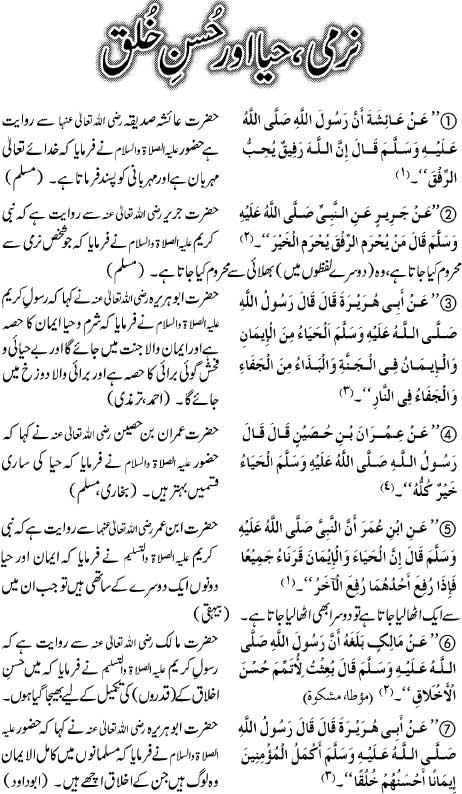
The Qur’an And The Science Of Stars
The Qur’an is that miraculous book of Allah that brought humanity from the days of ignorance to the age of rationalism. It is that unique and phenomenal book in the history of mankind that opened doors to every science. Allah said, “We shall show them Our signs in the Universe and in their own selves until it becomes manifest to them this the Qur’an is Truth.” (Qur’an, 41:53)
There have been many contentions and theories on scientific subjects by various people around the world, the Qur’an, however, has definite answers to all. It has been readily proven time and again; that many doctors and scientists have accepted that the Qur’an holds answers to all those questions which have been answered by them, recently, with the help of modern technology. As Allah said, “He has taught man which he knew not.” (Qur’an, 96:5)
Some accepted facts about the sun, the moon, and the stars are as follows:
Allah said, “And He has made the sun and the moon, both constantly pursuing their courses.” (Qur’an, 14:33)
When the sun is wound round and its light is lost. And when the stars fall. (Qur’an, 81:1-2)
Then when the stars lose their lights. (Qur’an, 77:8)
Qur’an has mentioned the two theories of science. First, about the movement of the stars, and the second about the end of solar energy. Under the Ptolemaic system, it was said that sunrises and pierces through the sky and the earth is stable. But, this notion was dropped in the 16th century and the theory of Prussian astronomer Copernicus was accepted, who said that the earth revolves around the sun.
It was only after Galileo, an Italian mathematician, that the true nature of the solar phenomenon was recognized. He invented a telescope and observed the rotation of the sun. Thus, what the Qur’an mentioned in the early 17th century was accepted by people in the seventeenth century. “And the sun runs on its fixed course for a term (appointed). That is the Decree of the All-Mighty, the All-Knowing.” (Qur’an, 36:38)
“And by the planets that move swiftly and hide themselves.” (Qur’an, 81: 16)
Scientists also say that the total life of the sun is 10 to the power 10 years, and it will eventually change into black dwarf stars. The Qur’an also confirms the fact that the sun’s light would disappear. They also admit that the death of the sun would be the end of this world — the Day of Judgment will come.
– by Ahmad Wahaj Siddiqui
Syed-ul-Mursaleen (S.A.W) Kay Mubarak Akhlaq
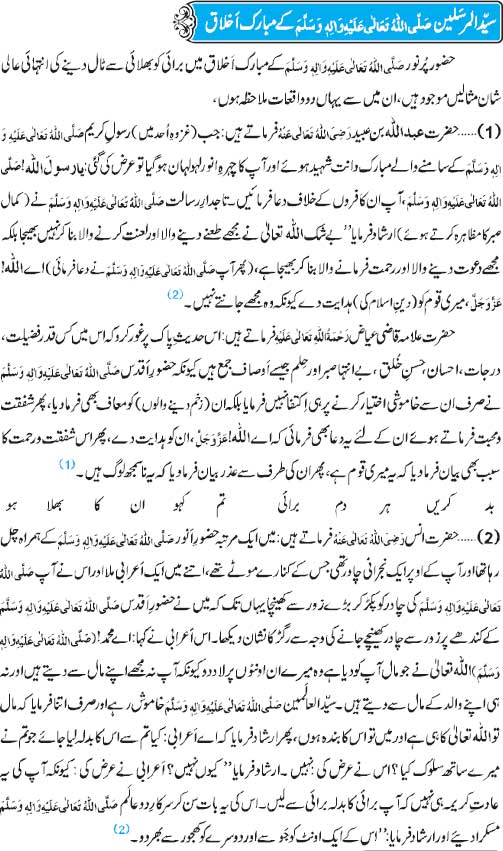
Muslim College Life: Dating, Drinking and Deen
Freedom. Young people live for the day when they can move out of the house and go to college and finally be free. Freedom from their parents, from restrictions on their lifestyle, from everyone telling them what to do.
This is why in college you find a whole generation that does what they want. Life’s short they say, let’s enjoy ourselves while we can.
So it goes for Muslims. In college, you find the most amazing things, Muslims who don’t pray, Muslims who date, go out to parties, and drink.
Why is this happening?
For one, when students go off to university they finally realize that what they believed in was blind. Religion becomes like a fairytale, when they got old enough, they knew better than to believe in it.
Most have little knowledge about Islam and have maybe memorized the right rituals to get by. Why believe something on faith, they ask. After all, we cannot see heaven or hell. How do we know Islam is right anyway?
Islamic culture to them means marrying someone they never knew. It means arranged marriages and never hanging out or having fun.
For girls Islamic culture has even less to offer. It would mean double standards or having to serve a husband the rest of her life.
The western alternative to this looks a lot more attractive.
In western culture “love and romance” are supposedly everywhere. Everyone is out looking for love freely. Meeting someone, going out, seeking pleasure sounds a lot better.
But what about the downside? For love at first sight, you need to have the right image, the right hair, the right clothes.
Girls have to aspire to be like the latest supermodels, they have to hold back age. Who’s going out with who, what are my friends thinking, what will happen if I don’t get the right girl or guy, what is my girlfriend or boyfriend thinking, all become important.
Frustration, desperation, and unhappiness become the norm.
Imagine all the heartache youth would save if they followed the Islamic alternative.
In true Islam, unlike culture, there is no gameplaying. If two people wish to be involved they are both straight with one another.
Unlike what goes on today amongst some Muslims, they both meet each other and make a contract to marry. Women are treated with respect, there is no sexual bombardment like there is in western society. Sex in western culture is also often seen as a vice or a sin of the flesh. But even in religious Islam, sex is seen as natural. As long as it is in the right circumstances when the two are committed to one another in marriage.
Drinking in college is also the norm, unfortunately. If you don’t drink or party you’re seen as weird. Drinking is cool and a way for people to socialize, meet and have fun. The one who doesn’t is less of a person and ‘misses out’. Drinking and all the harm that comes with it is cut off at the root in Islam. So many problems are avoided, accidents, pregnancy, violence, and even rape for example.
In college and in the world, success in life is not seen in terms of religion. It is seen as what other people think, one’s careers, how much money they make. If you are religious you must have failed at life. But why do we have this separation? and this blindness in religion?
The Quran tells us again and again not to have blind faith, not to follow the religion of our forefathers.
Yet, we as Muslims have stopped thinking. We may think about what our friends or other people will say, but we avoid thinking about the real issues.
We spend so much time on the opposite sex, thinking about careers, money, etc, but we forget to think about death and how much of this we will really be able to take with us?
“Every soul shall have a taste of death and only on the Day of Judgement shall you be paid your full recompense.. .for the life of this world is but goods and chattels of deception”
(Quran 3:185)
Shouldn’t we take the time to contemplate what will happen to us after we hit the grave? After all, what is the point of life if we are not accountable for our actions? If there is no creator, what is the point of being honest or good?
If we really look at our life we see that everything is indefinite, getting a job, even living until tomorrow. In fact, we could die anytime, this is definite, the _only_ dead certain thing in our life.
Most of us believe we can make up for our actions later or we can be religious later.
We are gambling.
The chances of our dying today are little, but the stakes are high. Allah reminds us of the importance of this,
“O you who believe, obey Allah as he should be obeyed, and die not except in a state of Islam”
(Quran3:102)
Each of us needs to decide.
On the Day of Judgement, it will be us alone who will be asked about our actions.
“Verily We have revealed the Book to thee in truth, for (instructing) mankind. He, then that receives guidance benefits his own soul: but he that strays injures his own soul…”
(Quran 39:41)
This is the true definition of freedom. To learn about Islam and the world openly. To contemplate life and death. And after learning the truth, obeying the word of God.
“Those on whom knowledge has been bestowed may learn that the (Quran) is the truth from your Lord and that they believe therein, and their hearts may be made humbly (open) to it…”
(Quran 22:54)
Once students have this rock-solid intellectual belief in Islam, the corruptness and falseness of the people around them are clear. The beauty and wisdom of the Islamic way, the best alternative is clear. What others do is of less importance. If others think they were weird to pray or weird, to be honest, they would still pray and still be honest because they know their deen.
Our Quran’s are left on the top shelves, gathering dust. Sometimes the most it is read is when someone dies. How is this to help, when the guidance comes too late. The Quran is for the living. The path to understanding and following Islam comes from learning first.
How many of us are Muslim, yet have never read the Quran in our native language?
How many of us are Muslim, yet have yet to open a book on hadith or sunnah?
How many of us defend Islam to non-Muslims, but do not follow it ourselves?
May Allah forgive and lead us and all those lost to the straight path.
In Sha Allah.
Ameen.
based on a talk by Abdul Wajid “Born to be Brown”, UK
by Huma Ahmad
Quran Ka Stah Na Choro
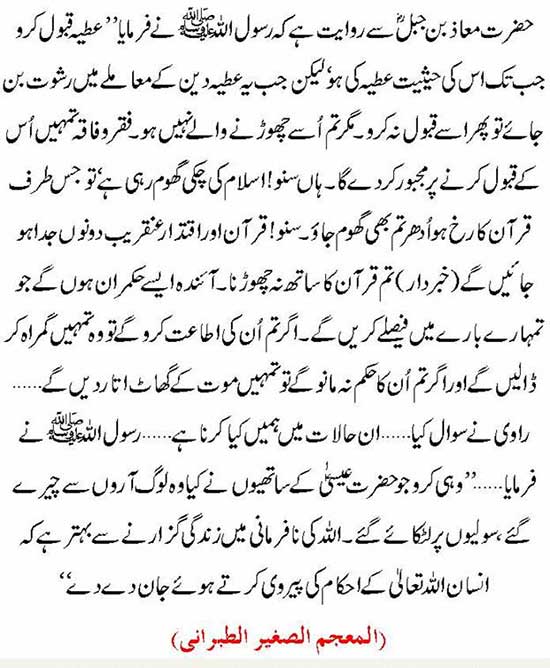
The Man Behind The Armor: Salah-ad-Din Al-Ayyubi
He defied the odds in an era of darkness. He set aside the criticism of those who called him crazy for wanting to do the seemingly impossible: uniting the Ummah, standing up to the Crusaders, and returning honor where it belonged. He was respected by both his friends and foes and is perhaps one of the few men whose name evokes feelings of honor and pride in the minds of so many people in every era and place.
He had the Crusaders chasing their tails in the battles of Alexandria, Hittin, Acre, Tyre, Beirut, Nablus, Haifa, Tiberius, Gaza, ‘Asqalan, Jerusalem, and dozens of other cities and towns across Sham and North Africa. He is popularly known as Salah-ad-Din the warrior.
But, who was the man behind the armor? How was he as a person, and as a Muslim? What personality does it take to carry out such heroic feats and achieve such a status?
In Al-Bidayah wan-Nihayah (13/5-6), Ibn Kathir said that at the time of his death, Salah-ad-Din hardly had any money in his possession, and this was because:
“…of the immense amount of gifts and charity and kindness that he used to show the leaders and ministers under his command, and even to his enemies.
“He was very simple in his clothing, food, drink, and transportation. He would only wear cotton, linen, and wool. It is not known that he ever approached anything forbidden or discouraged, especially after Allah blessed him with his kingdom. Rather, his greatest concern and goal was to aid Islam.”
Ibn Kathir continued:
“He was very strict in praying on time in the jama’ah (congregation). It is said that he never missed a single prayer in jama’ah for a great part of his life, even during the illness that killed him. The imam would enter and lead him in prayer, and he would struggle to get up and pray despite his weakness.”
“He loved to hear the recitation of the Qur’an and the reading of hadith and knowledge. He was constant and habitual in listening to ahadith being read to him, to the point that he would hear a section read to him while he was standing between the ranks of soldiers!”
Ibn Kathir also mentioned: “He had a soft heart, and was easily swayed to tears when he would hear ahadith.
“And Salah-ad-Din was from the bravest of people, and the strongest of them in body and heart despite the illnesses and sickness his body suffered from. This was most evident during the Siege of Acre, where despite the massive numbers of the enemy, he only increased in power and bravery.”
He also said:
“He was generous, well-rounded, always laughing and smiling. He would never slack off in any good that he did. He was extremely patient when doing good and worshipping Allah.”
In ‘Siyar A’lam An-Nubala” (15/436), it’s mentioned that Al-Muwaffaq Abdul Latif said:
“I went to Salah-ad-Din while he was in Jerusalem, and I saw a king who filled eyes with amazement and hearts with love, whether they were near or far. The first night I spent with him, I found his gatherings filled with scholars engaged in knowledge. He would listen intently and participate in their discussions. He would learn how to build walls and dig trenches, and he would then do this himself, carrying the rocks on his own shoulders.”
Al-’Imad said in ‘As-Siyar’ (15/440):
“He would only wear what was permissible to wear, such as linen and cotton. His gatherings were free of vain talk, and they were only attended by the most virtuous of people. He loved to hear ahadith being read with their chains of narration. He was forbearing, honest, pious, pure, and trustworthy. He would contain himself and not become angry. He would never turn back someone in need or embarrass someone who spoke in front of him. He was extremely kind and charitable and I never saw him praying except in jama’ah.”
Adh-Dhahabi said about his death: “And I never saw a king whose death people were sad for except him. This is because he was loved by everyone: he was loved by the righteous and the wicked, the Muslim and the Kafir.” This was Salah-ad-Din Al-Ayyubi. This was the man behind the armor. This was his lifestyle and character, and it was nothing other than this that served as the platform for the amazing feats across the lands that we remember him for today.
Such lifestyle and character is something you will find common between all legends of Islam, whether scholars, leaders, or martyrs. You always find them paying great attention to the daily recitation of the Qur’an, studying the Shariah, giving lots of charity, avoiding useless talk, and living simple lives free of luxury and excessive comfort. This is really the way to success. There is no way you can dream of defending Shariah if you don’t even have the willpower to implement it in your daily life.
What is interesting is Salah-ad-Din wasn’t always like this. Adh-Dhahabi mentions in ‘As-Siyar’ (15/434 and 436):
“Since his time as a ruler, he abandoned alcohol and worldly pleasures.”
“He used to drink alcohol, and then repented from it.”
That’s right. Salah-ad-Din Al-Ayyubi – this righteous man who singlehandedly changed the course of history – loved to drink and indulge in worldly pleasures. But he repented and transformed his life. This small fact teaches us a mighty lesson: not everyone is born in a life of righteousness. The great people we love and admire were not born with virtue. It also gives us hope that no matter how insignificant or lost we think we are, we can become someone truly great In Sha Allah.

